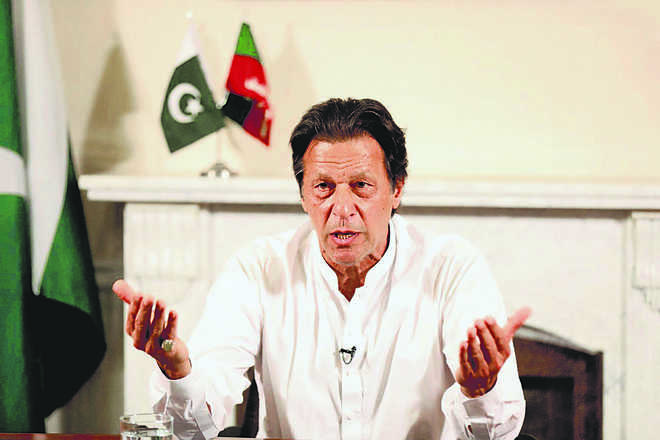Shahzad Raza
Three words define the life of Pakistan’s prime minister-in- waiting Imran Khan — notoriety, popularity and statesmanship. And one word describes his political career: persistence.
To quote Ray Kroc, the man behind the success of McDonald’s, nothing in this world can take the place of ‘persistence’. Khan is a perfect example of sheer persistence against the extreme odds he has faced in his personal, professional and political life. He has promised a ‘Naya Pakistan’ which would have good relations with its neighbours, including India. He envisions justice and opportunities for every Pakistani.
He had a knack for winning. Cricket provided him a way forward. His flamboyant character and attitude incurred bad reputation. Two of his known affairs involved Emma Sergeant and Sita White. People ignored his personal life as long as he was winning matches. He reached the zenith in 1992, bringing home the World Cup for the first time. He capitalised on that success and built the first state-of-the-art cancer hospital in memory of his late mother who had died of the disease. In 1996, he launched Pakistan Tehreek-e-Insaf (PTI).
Khan is the only Pakistani politician who struggled for 22 years to become the PM. It is because of his determination and persistence. His party contested the 2002 general election and could win only one National Assembly seat. He boycotted 2008 election. In 2013, he surfed on a popularity wave and bagged 31 seats. In 2018, he got the majority successfully selling to the masses his narrative that he could pull the country out of the crises.
He promised to undo the injustices of the past. His victory speech reflected statesmanship, decency and seriousness.
Every word of his speech was well-calculated and carefully written. His remarks about India were reflections of the briefings he was getting from the country’s defence establishment. His desire of resuming trade with India was not something he alone wanted at this juncture. Sources say he had the inputs from the military top brass to say those few lines. He urged the Indian leadership to discuss the Kashmir issue.
Interviews with senior officials revealed that both Pakistan and India have developed a high-level backchannel connection. That would certainly break the ice and help improve the relations which have touched a new low since Pathankot and Uri incidents.
Khan’s party would certainly form governments at the centre, Punjab and Khyber-Pakhtunkhawa provinces, providing the much-needed political stability. He has to revamp the system and deal with imminent financial crisis. Pakistan’s foreign debt is expected to climb $103 billion in 2019 and it must arrange $ 11 billion from the International Monetary Fund or any other source to avoid bankruptcy.
The opposition, including PML-Nawaz, MMA (a conglomerate of religious parties) and some nationalist parties, has rejected the election results and demanded fresh elections. He pre-empted the opposition’s move in his victory speech and offered help to investigate the charges.
Khan is expected to develop close relations with the military and the judiciary, something Nawaz Sharif, despite his long experience, failed to do. Khan knows he is going to sail in the dangerous waters. His own track record may be clean, yet he has in his team a large number of elected members who come from the same old traditional parties. They are people with dubious financial past. Some of his close aides face corruption cases. He cannot ignore them in the formation of his federal and provincial cabinets.
PTI spokesman Fawad Chaudhry argued that Khan in his victory speech asserted that accountability would begin with him and his ministers. How would he like himself to be remembered in history, he has next few months to figure out and the next few years to ensure.
— The writer is an Islamabad-based journalist
Unlock Exclusive Insights with The Tribune Premium
Take your experience further with Premium access.
Thought-provoking Opinions, Expert Analysis, In-depth Insights and other Member Only Benefits
Already a Member? Sign In Now










